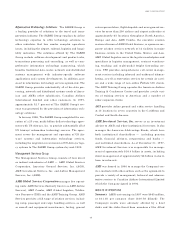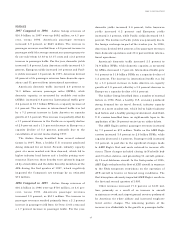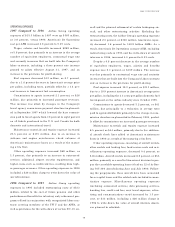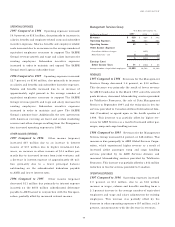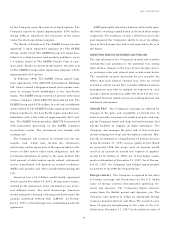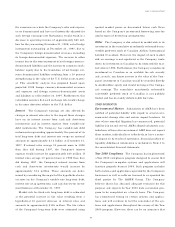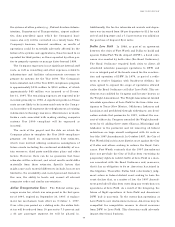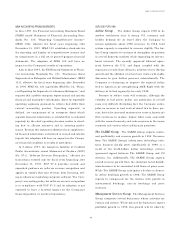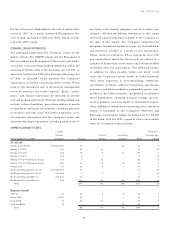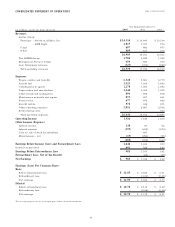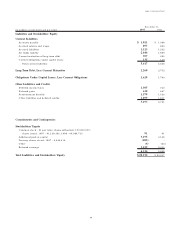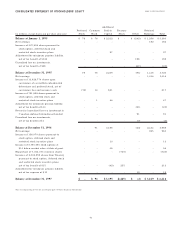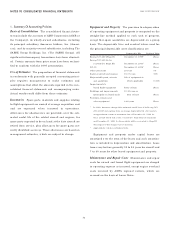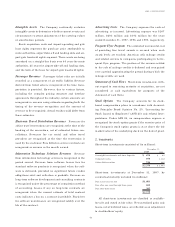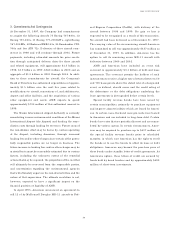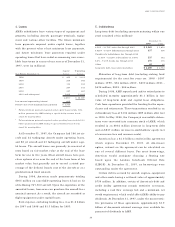American Airlines 1997 Annual Report Download - page 47
Download and view the complete annual report
Please find page 47 of the 1997 American Airlines annual report below. You can navigate through the pages in the report by either clicking on the pages listed below, or by using the keyword search tool below to find specific information within the annual report.
AMR CORPORATION
45
NEW ACCOUNTING PRONOUNCEMENTS
In June 1997, the Financial Accounting Standards Board
(FASB) issued Statement of Financial Accounting Stan-
dards No. 130, “Reporting Comprehensive Income”
(SFAS 130), effective for fiscal years beginning after
December 15, 1997. SFAS 130 establishes standards for
the reporting and display of comprehensive income and
its components in a full set of general-purpose financial
statements. The adoption of SFAS 130 will have no
impact on the Company’s results of operations.
Also in June 1997, the FASB issued Statement of Finan-
cial Accounting Standards No. 131, “Disclosures about
Segments of an Enterprise and Related Information” (SFAS
131), effective for fiscal years beginning after December
15, 1997. SFAS No. 131 supersedes SFAS No. 14, “Finan-
cial Reporting for Segments of a Business Enterprise,” and
requires that a public company report annual and interim
financial and descriptive information about its reportable
operating segments pursuant to criteria that differ from
current accounting practice. Operating segments, as
defined, are components of an enterprise about which
separate financial information is available that is evaluated
regularly by the chief operating decision maker in decid-
ing how to allocate resources and in assessing perfor-
mance. Because this statement addresses how supplemen-
tal financial information is disclosed in annual and interim
reports, the adoption will have no impact on the Compa-
ny’s financial condition or results of operations.
In October 1997, the American Institute of Certified
Public Accountants issued Statement of Position (SOP)
No. 97-2, “Software Revenue Recognition,” effective for
transactions entered into for fiscal years beginning after
December 15, 1997. SOP 97-2 provides revised and
expanded guidance on software revenue recognition and
applies to entities that earn revenue from licensing, sell-
ing or otherwise marketing computer software. The Com-
pany’s accounting policy for software revenue recognition
is in compliance with SOP 97-2 and its adoption is not
expected to have a material impact on the Company’s
financial position or results of operations.
OUTLOOK FOR 1998
Airline Group The Airline Group expects 1998 to be
another satisfactory year. A strong U.S. economy and
healthy demand for air travel allow the Company to
remain optimistic about 1998 revenues. In 1998, total
system capacity is expected to increase slightly. The Air-
line Group expects to continue to strengthen its position
in several domestic markets while expanding its interna-
tional network. The recently approved bilateral agree-
ment between the U.S. and Japan coupled with the
expansion of code-share alliances, delivery of new Boeing
aircraft and the addition of several new routes will enable
American to gain further presence internationally. The
Company is continuing to improve the regional airline
feed to American by strengthening AMR Eagle with the
delivery of its first regional jet in early 1998.
Pressure to reduce costs will continue, although the
volatility of fuel prices makes any prediction of overall
costs very difficult. Excluding fuel, the Company antici-
pates an increase in unit costs of about two to three per-
cent, driven by increased maintenance costs as American’s
fleet continues to mature, higher labor costs associated
with the normal seniority and scale increases in the union
contracts and various other inflationary pressures.
The SABRE Group The SABRE Group expects contin-
ued profitability and revenue growth in 1998. Revenues
from The SABRE Group’s information technology solu-
tions business should grow significantly in 1998 as a
result of the multi-billion dollar technology services
agreement signed between The SABRE Group and US
Airways, Inc. Additionally, The SABRE Group expects
overall revenue growth from the electronic travel distrib-
ution business to be consistent with those of prior years.
While The SABRE Group anticipates a decline in domes-
tic airline bookings growth in 1998, The SABRE Group
expects to compensate for the decline with growth in
international bookings, non-air bookings and price
increases.
Management Services Group The Management Services
Group comprises several businesses whose activities are
various and diverse. While most of the businesses expect
profitable growth in 1998, this growth will be offset by


